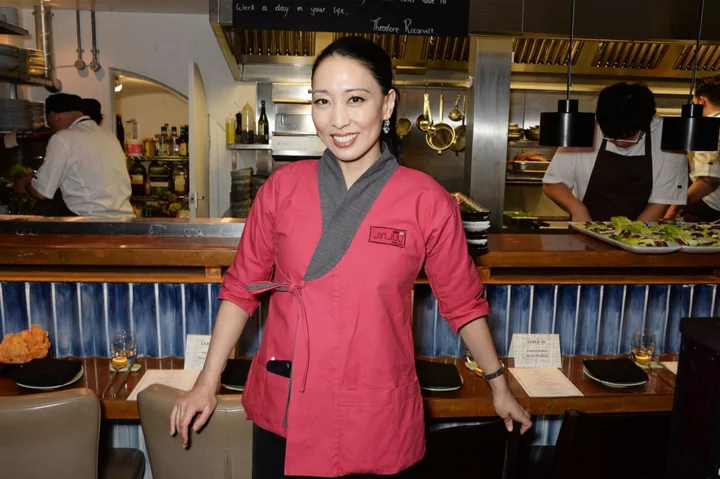Judy Joo says she used to read mostly about financial markets as she shows me around her quick-service Korean-American restaurant, Seoul Bird, in London’s Canary Wharf. These days it’s more cookbooks, food magazines and menus for the former derivatives salesperson who ditched Morgan Stanley’s trading floor in 2004 after five years and went on to work in Michelin-starred restaurants and host her own cooking show. Lots of people fantasize about ditching their careers to pursue their dream job. Joo is one of the few who made it happen. Work Shift spoke with Joo about how she engineered the successful switch. (Responses have been edited and condensed.)
Why did you leave banking?
It was just no sleep and I was burnt out. I think I had sinusitis and laryngitis for eight to nine months, I couldn’t get better because I was working all the time. And I just didn’t love the markets. Every moment of my free time I just wanted to read cookbooks, create recipes and bake cookies.
You also endured long hours and tough conditions when you started working for restaurants. What did you learn from that experience and, now that you're the boss, what's your approach?
My Chief Operations Officer Andrew Hales and I have been in the industry long enough to know what doesn’t work. Unpaid breaks in the middle of the day with no place to go, physically fighting for a staff meal that’s just kitchen scraps, having one day off, working two days and then another day off — it’s just not a nice way to live your life. We provide people with a good wage and a community — it’s all friends and friends of friends of people who came to the UK to take a chance. They can order whatever they want off the menu for their meal, they have a four-day working week and then they have three days off in a row.
UK restaurants have been hit from all sides: inflation, staff shortages and people working less from the office. How do you manage to run a successful business in that environment?
We’re keeping our supply chain fresh, using many suppliers and making them compete with each other. We had to raise our prices and it was more of an art: a little bit here, a little bit there. Energy prices are coming down, but then lettuce is becoming so expensive. Sugar has also gone through through the roof — Coke is more expensive than Coke Zero now. And we’re negotiating with our landlords: People are now working three days in the office, 2019 traffic isn’t coming back and they know it.
Does your banking stint make it easier?
How are we ordering and using ingredients? How are we writing the menu? Is it cost-effective? Are we meeting our targets? Owning a restaurant is finance at the end of the day. I can’t underestimate learning to model in Excel with different assumptions, like forecasting what happens if I open six days a week instead of seven, if I have 32 instead of 15 staff members. And because of my finance background, I’ve been able to raise money relatively easily. I can talk shop to everybody and I understand the parameters, what profit and loss is, how quickly we can pay back investors, what margins are. By the way, that’s why we’re a quick-service restaurant (which doesn’t include table service) — the margins are much better.
What would you say to people thinking about a radical career change?
Everyone has at least two or three lives in them. Don’t give up. You are going to be rejected a thousand times, but all it takes is that one time to make it a success story.

